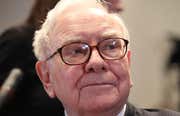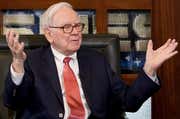|

|
Warren Buffett’s name is practically synonymous with his biggest success: Berkshire Hathaway (BRK.A). Warren became an integral part of Berkshire Hathaway in the early 1960s and helped the company expand into one of the largest conglomerates in the world. In 1956, his path to success began to accelerate when he moved back to Nebraska with his family.
Buffett's First Partnership
Before working for Benjamin Graham, Warren had been an investment salesman – a job that he liked doing, except when the stocks he suggested dropped in value and lost money for his clients. To minimize the potential of having irate clients, Warren started a partnership with his close friends and family. The partnership had unique restrictions attached to it: Warren himself would invest only $100 and, through re-invested management fees, would grow his stake in the partnership. Warren would take half of the partnership’s gains over 4% and would repay the partnership a quarter of any loss incurred. Furthermore, money could only be added or withdrawn from the partnership on December 31st, and partners would have no input about the investments in the partnership.
By 1959, Warren had opened a total of seven partnerships and had a 9.5% stake in more than a million dollars of partnership assets. Three years later, Warren was now a millionaire and merged all of his partnerships into a single entity.
Buying Berkshire Hathaway
In 1962, Warren saw an opportunity to invest in a New England textile company called Berkshire Hathaway and bought some of its stock. Warren began to aggressively buy shares after a dispute with its management convinced him that the company needed a change in leadership. Ironically, the purchase of Berkshire Hathaway is one of Warren’s major regrets. (For more, see: Always Bet On Berkshire Hathaway.)
Understanding the beauty of owning insurance companies – clients pay premiums today to possibly receive payments decades later – Warren used Berkshire Hathaway as a holding company to buy National Indemnity Company (the first of many insurance companies he would buy) and used its substantial cash flow to finance further acquisitions.
As a value investor, Warren is a sort of jack-of-all-trades when it comes to industry knowledge. Berkshire Hathaway is a great example. Buffett saw a company that was cheap and bought it, regardless of the fact that he wasn’t an expert in textile manufacturing. Gradually, Buffett shifted Berkshire’s focus away from its traditional endeavors, instead using it as a holding company to invest in other businesses. Over the decades, Warren has bought, held and sold companies in a variety of different industries.
Some of Berkshire Hathaway’s most well-known subsidiaries include, but are not limited to, GEICO (yes, that little Gecko belongs to Warren Buffett), Dairy Queen, NetJets, Benjamin Moore & Co., and Fruit of the Loom. Again, these are only a handful of companies of which Berkshire Hathaway has a majority share.
The company also has interests in many other companies, including American Express Co. (AXP), Costco Wholesale Corp. (COST), DirectTV (DTV), General Electric Co. (GE), General Motors Co. (GM), Coca-Cola Co. (KO), International Business Machines Corp. (IBM), Wal-Mart Stores Inc. (WMT), Proctor & Gamble Co. (PG) and Wells Fargo & Co. (WFC).
(related: How Does Warren Buffett Choose The Companies He Buys?)
Berkshire Woes
Business for Buffett hasn’t always been rosy, though. In 1975, Buffett and his business partner, Charlie Munger, were investigated by the Securities and Exchange Commission (SEC) for fraud. The two maintained that they had done nothing wrong and that the purchase of Wesco Financial Corporation only looked suspicious because of their complex system of businesses.
Further trouble came with a large investment in Salomon Inc. In 1991, news broke of a trader breaking Treasury bidding rules on multiple occasions, and only through intense negotiations with the Treasury did Buffett manage to stave off a ban on buying Treasury notes and subsequent bankruptcy for the firm.
In more recent years, Buffett has acted as a financier and facilitator of major transactions. During the Great Recession, Warren invested and lent money to companies that were facing financial disaster. Roughly 10 years later, the effects of these transactions are surfacing and they’re enormous:
- A loan to Mars Inc. resulted in a $680 million profit
- Wells Fargo & Co. (WFC), of which Berkshire Hathaway bought almost 120 million shares during the Great Recession, is up more than 7 times from its 2009 low
- American Express Co. (AXP) is up about five times since Warren’s investment in 2008
- Bank of America Corp. (BAC) pays $300 million a year and Berkshire Hathaway has the option to buy additional shares at around $7 each – less than half of what it trades at today
- Goldman Sachs Group Inc. (GS) paid out $500 million in dividends a year and a $500 million redemption bonus when they repurchased the shares.
Most recently, Warren has partnered up with 3G Capital to merge J.H. Heinz Company and Kraft Foods to create the Kraft Heinz Food Company (KHC). The new company is the third largest food and beverage company in North America and fifth largest in the world, and boasts annual revenues of $28 billion. In 2017, he bought up a significant stake in Pilot Travel Centers, the owners of the Pilot Flying J chain of truck stops. He will become a majority owner over a six-year period.
Modesty and quiet living meant that it took Forbes some time to notice Warren and add him to the list of richest Americans, but when they finally did in 1985, he was already a billionaire. Early investors in Berkshire Hathaway could have bought in as low as $275 a share and by 2014 the stock price had reached $200,000, and was trading just under $300,000 earlier this year.
Warren Buffett: Net Worth & Current Influence
-
 Investing
InvestingBerkshire's Record Cash Guarantees More Deals (BRK-B)
Warren Buffett's Berkshire Hathaway is sitting on more than $70 billion in cash, almost guaranteeing what will happen next: more big acquisitions. -
 Taxes
TaxesWarren Buffett's Berkshire Gains $37 Billion from Tax Cuts
The recent changes to U.S. tax law will be a boon for Berkshire Hathaway's billionaire head, Warren Buffett. -
 Insights
InsightsBuffett's Berkshire Hathaway Retains S&P Rating
Warren Buffett's Berkshire Hathaway manages to retain its S&P rating after taking on $10 billion in debt. -
 Investing
InvestingWhat Will Become of Berkshire Hathaway Beyond Buffett?
Warren Buffett, who has become almost synonymous with the term “investor,” remains robust, but at 83 is clearly somewhere in the fourth quarter of the game. What does that mean for Berkshire ... -
 Investing
InvestingWhere Does Warren Buffett Keep His Money?
Understand who Warren Buffett is and where he has invested his money over the years. -
 Investing
InvestingTwo Things We Learned From Billionaire Warren Buffett's Shareholder Letter
Billionaire Warren Buffett heaped praise on his potential successors in his annual letter to Berkshire Hathaway shareholders. -
 Financial Advisor
Financial AdvisorInside Warren Buffett's Woodstock for Capitalists
The annual Berkshire Hathaway meeting kicks off this weekend, and it's the 52nd year with Warren Buffett at the helm. Here's what to expect at the meeting. -
 Financial Advisor
Financial AdvisorIs It Time To Break Up Berkshire Hathaway?
Warren Buffett's Berkshire Hathaway is at the pinnacle of success and that’s when business leaders have to be the most wary. Will investors still be partying in Omaha a decade from now? -
 Investing
InvestingWhy Hedge Fund Managers are Loving Buffett
Berkshire Hathaway was a favorite among hedge fund managers last year. What is the draw at this particular point in time?


